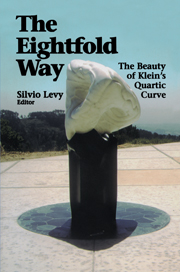Book contents
- Frontmatter
- Contents
- Preface: MSRI and the Klein Quartic
- The Eightfold Way: A Mathematical Sculpture by Helaman Ferguson
- The Geometry of Klein's Riemann Surface
- The Klein Quartic in Number Theory
- Hurwitz Groups and Surfaces
- From the History of a Simple Group
- Eightfold Way: The Sculpture
- Invariants of SL2(𝔽q) . Aut(𝔽q) Acting on ℂn for q = 2n ± 1
- Hirzebruch's Curves F1 , F2 , F4 , F14 , F28 for Q(V7)
- On the Order-Seven Transformation of Elliptic Functions
On the Order-Seven Transformation of EllipticFunctions
Published online by Cambridge University Press: 25 June 2025
- Frontmatter
- Contents
- Preface: MSRI and the Klein Quartic
- The Eightfold Way: A Mathematical Sculpture by Helaman Ferguson
- The Geometry of Klein's Riemann Surface
- The Klein Quartic in Number Theory
- Hurwitz Groups and Surfaces
- From the History of a Simple Group
- Eightfold Way: The Sculpture
- Invariants of SL2(𝔽q) . Aut(𝔽q) Acting on ℂn for q = 2n ± 1
- Hirzebruch's Curves F1 , F2 , F4 , F14 , F28 for Q(V7)
- On the Order-Seven Transformation of Elliptic Functions
Summary
This is a translation of Klein's Ueber die Transformation siebenter Ordnung derelliptischen Jilunktionen, firstpublished in MathematischeAnnalen 14 (1879),428--471,and dated early November 1878. It follows the textprinted in his GesammelteMathematische Abhandlugen, except wheretypos not present in the original had crept intoformulas. I redrew all the figures (they had alreadybeen redrawn for the Abhandlugen: see caption on page 320),except for Figure 9 and the bottom figures on pages315 and 316. I have not attempted to modernize theterminology, except on a few occasions when the useof current language allowed me to replace alongwinded phrase by something crisper and clearer.Nor have I tried to approximate the Englishmathematical style of the time. The goal has been toproduce a readable translation, as close to theoriginal ideas as possible. Bibliographic citationshave been converted to the house format, the editorsof the Abhandlugenhaving taken similar liberties. Brackets,if not delimiting bibliographic tags, indicateinterpolated text, written either for the Abhandlugen (unsigned, or K.= Klein, B.-H. = Bessel-Hagen) or for this edition(L. = Levy). I'm grateful to Jeremy J. Gray for manyexcellent suggestions.
In the study of the fifth-order transformation ofelliptic functions we encounter, along with themodular equation of sixth degree and its well-knownresolvent of fifth degree, the Galois resolvent ofdegree 60, called the icosahedml equation, which governs both.Starting from the icosahedral equation one sees withgreat ease the rule of formation and the propertiesof those lower-degree equations.
Information
- Type
- Chapter
- Information
- The Eightfold WayThe Beauty of Klein's Quartic Curve, pp. 287 - 332Publisher: Cambridge University PressPrint publication year: 1999
